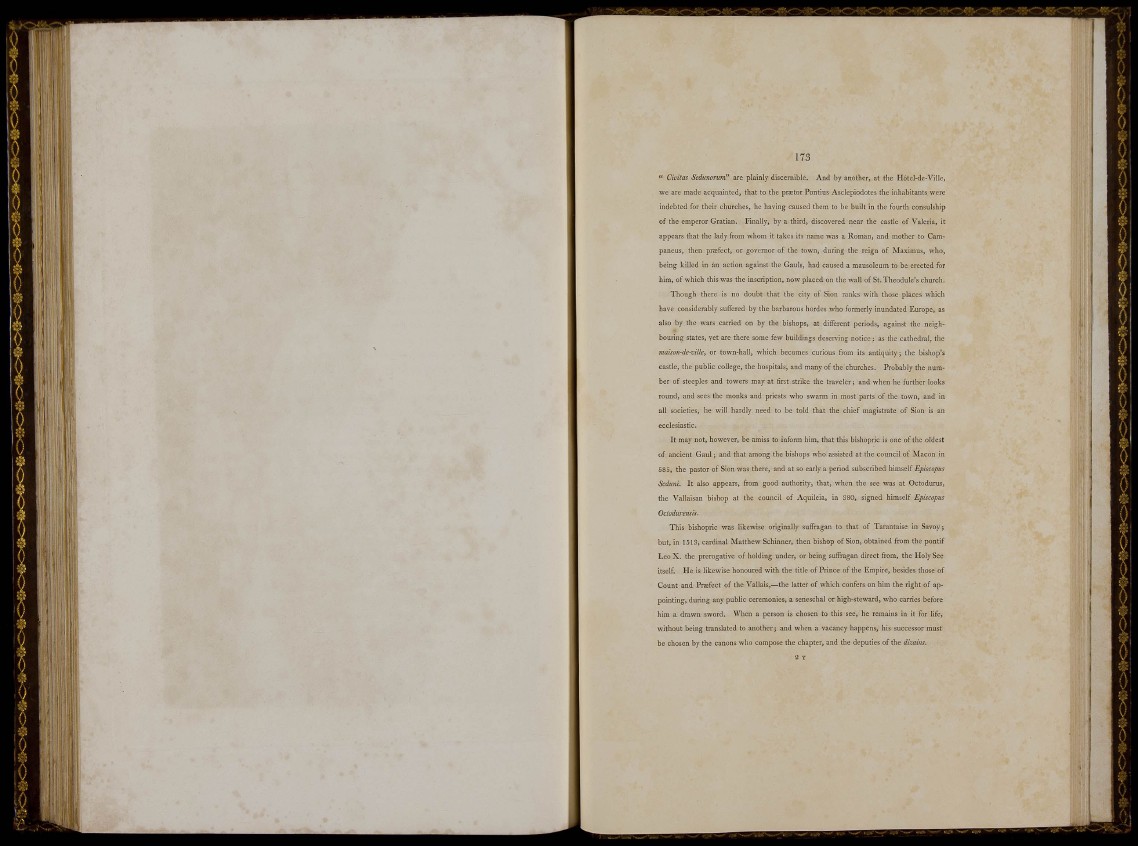
" Civitas Scduiiomm" are plainly discernible. And by another, at the Hotel-de-Ville,
we are made acquainted, that to the prstor Pontius Asclepiodotes the inhabitants were
indebted for their churches, he having caused them to be built in the fourth consulship
of the emperor Gradan. Finally, by a third, discovered near the castle of Valeria, it
appears that the lady from whom it takes its name was a Roman, and mother to Campaneus,
then prefect, or governor of the town, during the reign of Maximus, who,
being killed in an action against the Gauls, had caused a mausoleum to be erected for
him, of which this was the inscription, now placed on the wall of St. Theodule's church.
Though there is no doubt that the city of Sion ranks with those places which
have considerably suffered by the barbarous hordes who formerly inundated Europe, as
also by the wars carried on by the bishops, at different periods, against the neighbouring
states, yet are there some few buildings deserving notice; as the cathedral, the
maison-de-ville, or town-hall, which becomes curious from its antiquity 5 the bishop's
castle, the public college, the hospitals, and many of the churches. Probably the number
of steeples and towers may at first strike the traveler; and when he further looks
round, and sees the monks and priests who swarm in most parts of the town, and in
all societies, he will hardly need to be told that the chief magistrate of Sion is an
ecclesiastic.
It may not, however, be amiss to inform him, that this bishopric is one of the oldest
of ancient Gaul; and that among the bishops who assisted at the council of Macon in
685, the pastor of Sion was there, and at so early a period subscribed himself Episcopus
Seduni. It also appears, from good authority, that, when the see was at Octodurus,
the Vallaisan bishop at the council of Aquileia, in 380, signed himself Episcopus
Oclodtirensis.
This bishopric was likewise originally suffragan to that of Tarantaise in Savoy;
but, in 1513, cardinal Matthew Schinner, then bishop of Sion, obtained from the pontif
Leo X . the prerogative of holding under, or being suffragan direct from, the Holy See
itself. He is likewise honoured with the title of Prince of the Empire, besides those of
Count and Pra2fect of the Valíais,—the latter of which confers on him the right of appointing,
during any public ceremonies, a seneschal or high-steward, who carries before
him a drawn sword. Wlien a person is chosen to this see, he remains in it for life,
without being translated to another} and when a vacancy happens, his successor must
be chosen by the canons who compose the chapter, and the deputies of the dizains.
•fl'iiil -
! .1::;